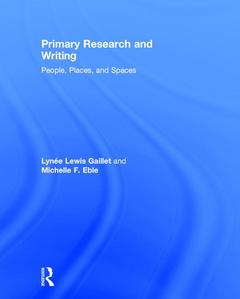Primary Research and Writing People, Places, and Spaces
Auteurs : Gaillet Lynee Lewis, Eble Michelle F.

Developed for emerging academic writers, Primary Research and Writing offers a fresh take on the nature of doing research in the writing classroom. Encouraging students to write about topics for which they have a passion or personal connection, this text emphasizes the importance of primary research in developing writing skills and abilities.
Authors Lynée Lewis Gaillet and Michelle F. Eble have built a pedagogical approach that makes archival and primary research interesting, urgent, and relevant to emerging writers. Students are able to explore ways of analyzing their findings and presenting their results to their intended readers.
With in-text features to aid students in understanding primary research and its role in their writing, chapters include special elements such as:
- Communities in Context ? Profiles of traditional and digital communities that help students understand the characteristics of communities and group members
- Profiles of Primary Researchers ? Spotlights on professionals, giving an illuminating look into the role primary research plays in real-world research and writing
- Student Writing ? Examples of exemplary student writing that demonstrate how research can be relevant, engaging, and interesting, with annotations.
- Invention Exercises - Exercises designed to help students locate primary investigation within communities that they already understand or find appealing
- Writing Exercises - Writing exercises that offer students practice in exploring communities and investigating primary materials.
- Readings ? Annotated readings with questions to guide analysis, pulled from a variety of rich sources, that give students inspiration for undertaking their own research projects.
This text has a robust companion website that provides resources for instructors and students, with sample syllabi, chapter overviews, lecture outlines, sample assignments, and a list of class resources.
Primary Research and Writing is an engaging textbook developed for students in the beginning stages of their academic writing careers, and prepares its readers for a lifetime of research and writing.
Preface
Part I : Primary Research and Rhetorical Tools
1. Introduction to Primary Research
2. Defining and Engaging with Communities
3. Identifying a Research Topic and Thinking Like a Researcher
4. Becoming an Authority on a Topic
Part II: Methods for Inquiry and Conducting Primary Research
5. Beginning Archival Research: A Practical Guide
6. Fieldwork and Ethnographic Observation
7. Interviews: Researching People
8. Surveys: Researching Beliefs, Opinions, and Attitudes
Part III: Writing and Delivering Your Research
9. A Rhetorical Approach to Research and Writing
10. Reporting and Delivering Research Findings
11. Documenting Your Research: MLA
12. Documenting Your Research: APA
Appendix -Archival Resources
Lynée Lewis Gaillet is Professor of English at Georgia State University where she directs the Writing Studio and Lower Division Studies. She is author of numerous articles addressing Scottish rhetoric, writing program administration, and composition/rhetoric pedagogy. She is editor of Scottish Rhetoric and Its Influences (1998), Stories of Mentoring (2008), and The Present State of the History of Rhetoric (2010).
Michelle F. Eble is associate professor of rhetoric and professional communication at East Carolina University where she serves as Director of Graduate Studies. She has published in Computers and Composition, Technical Communication, and Technical Communication Quarterly on professional writing theory and practice, especially as it relates to rhetorical engagement, technology, and design. She is the co-editor of Stories on Mentoring: Theory and Praxis (2008).
Date de parution : 08-2015
20.3x25.4 cm
Date de parution : 10-2015
20.3x25.4 cm
Thème de Primary Research and Writing :
Mots-clés :
writing research methods; communication research methods; media research methods; San Franc Isco; primary research; Young Man; Michigan State University; Numerical Survey Data; Salt Lake City Public Library; Group Fitness Classes; NATIONAL ACADEMIES; Franc Isco; North Carolina General Assembly; In-text Citation; MLA Style; Chicago Fire Department; Reflective Practices; Luis De Santangel; Firemen; Obesity Prevention; Institutional Review Board; Works Cited; National Geographic; Quotation Marks; Emergency Room; Wildlife Biologists; Oral History; Familial Communities


